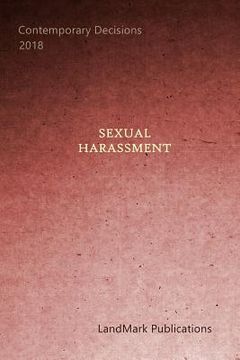Reseña del libro "Sexual Harassment (en Inglés)"
THIS CASEBOOK contains a selection of U. S. Court of Appeals decisions that analyze and discuss issues surrounding workplace sexual harassment claims. * * * In the companion cases of Faragher v. City of Boca Raton, 524 U.S. 775 (1998) and Burlington Industries, Inc. v. Ellerth, 524 U.S. 742 (1998), the U.S. Supreme Court established standards for when an employee who was harassed in the workplace by a supervisor may impute liability to the employer. In doing so, the Court acknowledged the sensitive nature of workplace harassment: "a supervisor's power and authority invests his or her harassing conduct with a particular threatening character." Ellerth, 524 U.S. at 763. Minarsky v. Susquehanna County, (3rd Cir. 2018). * * * If the harassment resulted in a "tangible employment action" against the employee, then the employer is strictly liable. Jones v. Se. Pa. Transp. Auth., 796 F.3d 323, 328 (3d Cir. 2015) (quoting Pa. State Police v. Suders, 542 U.S. 129, 143 (2004)). The Supreme Court has described a tangible employment action as "hiring, firing, failing to promote, reassignment with significantly different responsibilities, or a decision causing a significant change in benefits." Ellerth, 524 U.S. at 761. * * * However, if the harassed employee suffered no tangible employment action, [ ] the employer can avoid liability by asserting the Faragher-Ellerth affirmative defense. The employer must show "(a) that the employer exercised reasonable care to prevent and correct promptly any sexually harassing behavior, and (b) that the plaintiff employee unreasonably failed to take advantage of any preventive or corrective opportunities provided by the employer or to avoid harm otherwise." Faragher, 524 U.S. at 807; Ellerth, 524 U.S. at 765. * * * The cornerstone of this analysis is reasonableness: the reasonableness of the employer's preventative and corrective measures, and the reasonableness of the employee's efforts (or lack thereof) to report misconduct and avoid further harm. Thus, the existence of a functioning anti-harassment policy could prove the employer's exercise of reasonable care so as to satisfy the first element of the affirmative defense. Faragher, 524 U.S. at 807. * * * To prove the second element of the affirmative defense, that the plaintiff unreasonably failed to avail herself of the employer's "preventive or corrective opportunities," the Supreme Court has held that "proof that an employee failed to [exercise] reasonable care to avoid harm . . . will normally suffice to satisfy the employer's burden under the second element of the defense." Id. at 807-08; Ellerth, 524 U.S. at 765.

